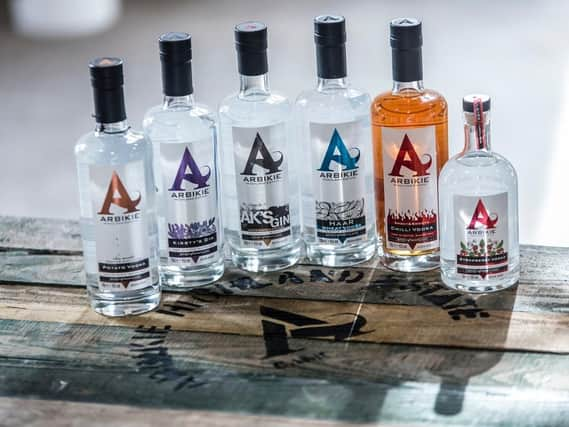Planning ahead key for ambitious Scots firms looking to grow exports


Bryan Fraser, head of company growth at Scottish Enterprise (SE), says: “We are encouraging Scottish businesses to look ahead and plan for change. There are many ways to do this, such as thinking about potential risks and taking steps to protect against them.
“This can be done by creating strategies to quickly respond to sudden disruptions or longer term economic or regulatory change.
This might seem daunting or time consuming to some business owners, so SE has developed a range of support to help them plan ahead for greater financial security in turbulent times.


The organisation has experts to support businesses with scenario planning – recreating disruptions such as a post-Brexit environment – and the changed costs of importing, exporting and sourcing new suppliers.
Experts regularly assist with building an effective workforce strategy and can advise on increasing innovation and improving efficiency, all of which can help companies stay competitive in international markets.
Managing the cost of maintaining operations during periods of disruption can be a huge strain on a business and so to help with this, SE offers financial planning advice and support, including offering debt and equity finance, plus guidance on funding and grants.
Fraser also suggests businesses consider diversification, as a company overly exposed to the EU market can consider exporting further afield, with professional help.
“If you’re planning to access new markets, like the US or Asia, these things take time, planning and significant investment,” he explains.
“We have experts who can advise on local suppliers as well as helping companies identify distribution routes in new markets. That can be really valuable.”
Strategy
The Scottish Government’s plans to increase the country’s exports from 20 per cent to a quarter of GDP over the next decade might seem ambitious to some, but there is plenty support for businesses looking to export at any stage.
Organisations such as Scottish Enterprise (SE) and its international arm, Scottish Development International (SDI), help businesses fit exporting into their growth plans easily.
Vision looks at the export journeys of some of Scotland’s most recent success stories.
Sticky Heelz
Frustrated by ill-fitting designer shoes, in 2015 Laura Birrell began developing a footwear product which she says can help the 60 per cent of the population with issues that mean their shoes don’t fit correctly.
She devised a two-part design to fit feet comfortably in court shoes and, in 2016, established Glasgow-based Sticky Heelz.
The RBS-backed Entrepreneurial Spark accelerator programme supported Birrell in areas she was unfamiliar with, such as retail and e-commerce, enabling her to explore predictive costs.
To scale the business, the UK market wasn’t large enough to sell her product at a cost of less than £10, so she turned to SDI for advice on exporting it.
“An export strategy workshop run over six weekly sessions was really critical because there are a lot of acronyms and terms in exporting – and the different terminology might have different financial implications,” explains Birrell.
“It was just a minefield. Trying to read it all was really difficult, but this course really helped me understand what the different terms mean and how to understand which markets are best to enter into.”
A trade mission to New York with Glasgow Chambers of Commerce established relationships with retailers and buyers there, and a Make it to Market grant from SE paid for a US patent.
With the added support of Wilson Imports, based in Hillington but with offices in London, New York and Hong Kong, the Birrell’s business has grown substantially, and last August she struck a distribution deal which put Sticky Heelz’s foot firmly in the US market’s door.
The Asian market is next on Birrell’s horizon, where all signs point to a bright future for her enterprise.
Birrell advises: “Business owners should understand the market they are going into because there might be a retail model that works here, but it could be completely different in, say, America or Canada.
“Definitely do research and go on any trade trips to engage with invaluable experts on the ground. SDI and Business Gateway advisers offer great services at each stage to help evaluate the best strategy for entry to a market.”
Arbikie Highland Estate Distillery
The Stirling family has farmed at Arbikie, near Arbroath in Angus, since 1660, but four years ago brothers John, Iain and David diversified into the spirits industry with a field-to-bottle outlook.
Iain had worked for distillers Whyte & Mackay, Jim Bean and Diageo before the lightbulb moment struck to establish Arbikie Highland Estate Distillery in 2013 and create unique spirits with ingredients that were already produced on the family farm.
It all began with a potato vodka – the first commercially-made version of its kind to be produced in Scotland – made with with Maris Piper, King Edward, and Cultra potatoes.
It formed the base for Kirsty’s Gin, named in honour of Arbikie’s master distiller, Kirsty Black, and the field-to-bottle favourite won gold at the San Francisco World Spirit Awards in 2016.Arbikie now has a portfolio of exclusive premium spirits, including Scotland’s first rye whisky for more than 100 years, and its products have been stocked by retailers across Europe, Australia, Canada, Singapore, South Africa and the United Arab Emirates.
Iain Stirling says: “Whisky will always be an export market, it is where the Scottish whisky industry makes its money, particularly with expensive, premium whisky and that is the key market for us.
“All of our products are super-premium so they’re in expensive price points around the world.”
The team began in the UK market, treating London as an export market due to its spending levels and world-class hospitality offering, before moving into renowned “cocktail cities” – and the US is next on Arbikie’s radar.
However, the distillery’s success so far, in part, boils down to research and the support the team has received along the way.
“[SE and SDI] have a very good system there where someone might be operating within a domestic market with support from SE and then if they want to start looking at exporting, they can talk to someone within SDI about other markets for their products,” explains Stirling.
“There are well-trodden paths within the food and drink sector, and the exports and growth are huge.
“There is a massive team within SDI who are market specialists and who very much focus on food and drink. That provides very specialist knowledge and local contacts in terms of distributors or retailers.”